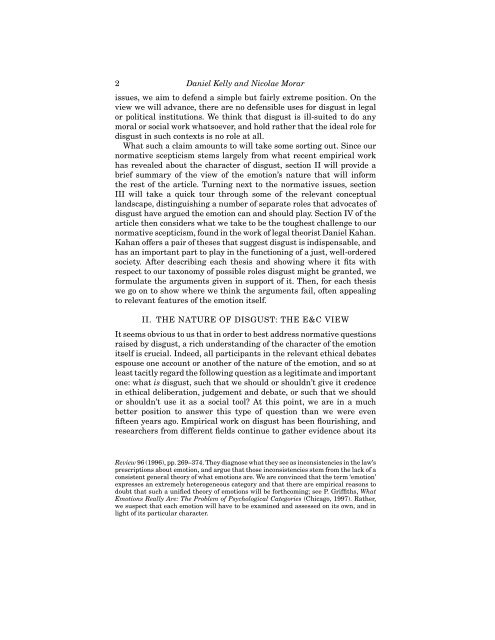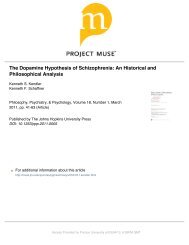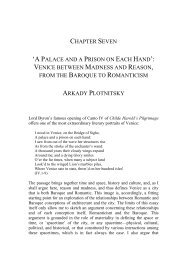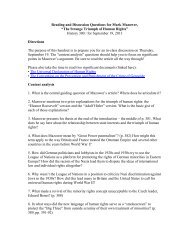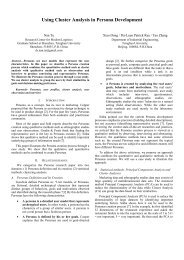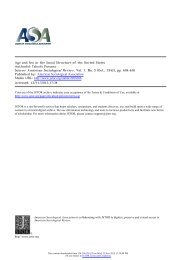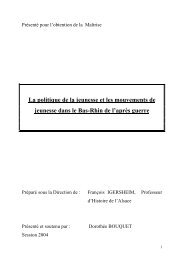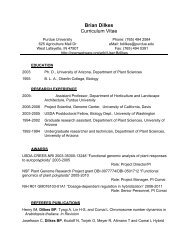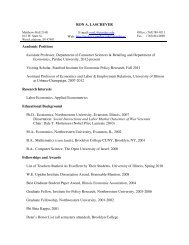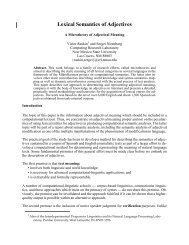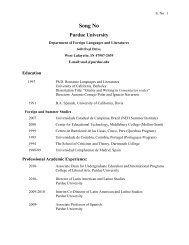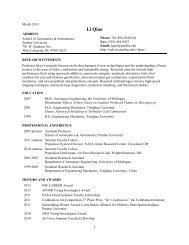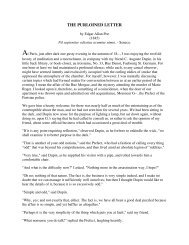Against the Yuck Factor - Career Account Web Pages - Purdue ...
Against the Yuck Factor - Career Account Web Pages - Purdue ...
Against the Yuck Factor - Career Account Web Pages - Purdue ...
You also want an ePaper? Increase the reach of your titles
YUMPU automatically turns print PDFs into web optimized ePapers that Google loves.
2 Daniel Kelly and Nicolae Morar<br />
issues, we aim to defend a simple but fairly extreme position. On <strong>the</strong><br />
view we will advance, <strong>the</strong>re are no defensible uses for disgust in legal<br />
or political institutions. We think that disgust is ill-suited to do any<br />
moral or social work whatsoever, and hold ra<strong>the</strong>r that <strong>the</strong> ideal role for<br />
disgust in such contexts is no role at all.<br />
What such a claim amounts to will take some sorting out. Since our<br />
normative scepticism stems largely from what recent empirical work<br />
has revealed about <strong>the</strong> character of disgust, section II will provide a<br />
brief summary of <strong>the</strong> view of <strong>the</strong> emotion’s nature that will inform<br />
<strong>the</strong> rest of <strong>the</strong> article. Turning next to <strong>the</strong> normative issues, section<br />
III will take a quick tour through some of <strong>the</strong> relevant conceptual<br />
landscape, distinguishing a number of separate roles that advocates of<br />
disgust have argued <strong>the</strong> emotion can and should play. Section IV of <strong>the</strong><br />
article <strong>the</strong>n considers what we take to be <strong>the</strong> toughest challenge to our<br />
normative scepticism, found in <strong>the</strong> work of legal <strong>the</strong>orist Daniel Kahan.<br />
Kahan offers a pair of <strong>the</strong>ses that suggest disgust is indispensable, and<br />
has an important part to play in <strong>the</strong> functioning of a just, well-ordered<br />
society. After describing each <strong>the</strong>sis and showing where it fits with<br />
respect to our taxonomy of possible roles disgust might be granted, we<br />
formulate <strong>the</strong> arguments given in support of it. Then, for each <strong>the</strong>sis<br />
we go on to show where we think <strong>the</strong> arguments fail, often appealing<br />
to relevant features of <strong>the</strong> emotion itself.<br />
II. THE NATURE OF DISGUST: THE E&C VIEW<br />
It seems obvious to us that in order to best address normative questions<br />
raised by disgust, a rich understanding of <strong>the</strong> character of <strong>the</strong> emotion<br />
itself is crucial. Indeed, all participants in <strong>the</strong> relevant ethical debates<br />
espouse one account or ano<strong>the</strong>r of <strong>the</strong> nature of <strong>the</strong> emotion, and so at<br />
least tacitly regard <strong>the</strong> following question as a legitimate and important<br />
one: what is disgust, such that we should or shouldn’t give it credence<br />
in ethical deliberation, judgement and debate, or such that we should<br />
or shouldn’t use it as a social tool? At this point, we are in a much<br />
better position to answer this type of question than we were even<br />
fifteen years ago. Empirical work on disgust has been flourishing, and<br />
researchers from different fields continue to ga<strong>the</strong>r evidence about its<br />
Review 96 (1996), pp. 269–374. They diagnose what <strong>the</strong>y see as inconsistencies in <strong>the</strong> law’s<br />
prescriptions about emotion, and argue that those inconsistencies stem from <strong>the</strong> lack of a<br />
consistent general <strong>the</strong>ory of what emotions are. We are convinced that <strong>the</strong> term ‘emotion’<br />
expresses an extremely heterogeneous category and that <strong>the</strong>re are empirical reasons to<br />
doubt that such a unified <strong>the</strong>ory of emotions will be forthcoming; see P. Griffiths, What<br />
Emotions Really Are: The Problem of Psychological Categories (Chicago, 1997). Ra<strong>the</strong>r,<br />
we suspect that each emotion will have to be examined and assessed on its own, and in<br />
light of its particular character.


